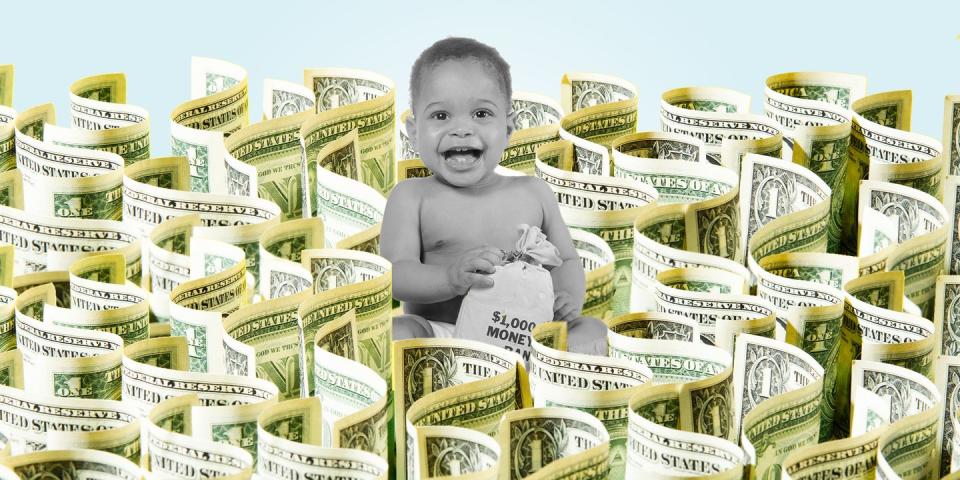U.S. Parents, Congrats on Your $300. You’re Still Getting Screwed.

When I first visited Berlin, in the summer of 2012, I was captivated by all the dads. Cycling around the city, I noticed thirty-something, heavily tattooed men pushing strollers into and out of playgrounds; twenty-something, buttoned-up businessmen pulling their toddlers on four-wheeled wagons as if running rickshaws. These style-maven fathers, teeming with northern European ease, were everywhere, and seemingly of every ethnicity. Whether sitting with their mates outside a Spätkauf, Berlin’s bodega equivalent, with a toddler in their lap, or watching a soccer game at a bar with a newborn nestled in their arms, they were all doing the same, remarkable thing to my American eyes: It was the middle of the workday, and these men were taking care of their children.
At the time, I took my surprise as the byproduct of my life in Brooklyn, where I moved mostly in queer and leftist circles. (This was before I saw a recent UNICEF report on the richest countries’ family friendliness, which ranked the United States in very last place; Germany came in sixth.) The people I knew in New York had decided not to reproduce, many because of the exorbitant cost. We’d come of age amidst 2008’s financial crisis and its aftermath. I myself had never wanted children; I feared the high mortality rates for Black mothers in America, and I didn’t think I could afford it.
This week, as part of the American Rescue Plan the Biden administration began sending monthly payments of up to $300 per child to American families. This subsidy, known as a child tax credit, surely will assuage the spirit of working-class parents, especially those who’ve been furloughed or evicted during the Covid-19 pandemic, and will alleviate, if not correct, the class disparity that has long divided the country. Such support will provide a desperately needed backstop to families at risk of endemic poverty. That alone is reason to celebrate. But the policy does not go far enough: eligibility is not universal, and the program is set to expire in December.
Germany offers proof that there’s a better way.
I moved to Berlin in 2017, because I desperately wanted to escape the Trump regime and it was the only place I was offered a job after completing my PhD, and soon felt the pangs of Kinderwunsch, or the desire to have a child. Though I sometimes envision my partner pushing a stroller alongside all of the other Berliner moms and dads, that dream has yet to come to fruition. If it did—if we were to start a family—we would have many advantages. It doesn’t matter that he’s British and I’m American; the German government provides extensive benefits for all families, irrespective of nationality. To start, we’d receive Kindergeld, a tax credit much like the one now in place in the U.S.: 219 euros each month for the first and second children, 225 euros for the third, and 250 euros for each subsequent child. The compensation wouldn’t end there: For the first year of our child’s life, we both would be eligible for a parental allowance, known as Elterngeld, amounting to up to two-thirds of our net wages. In April, the Berlin Senate passed a resolution that expands family services, increases parental allowance, and even fund recreational trips.

“I quickly realized the benefits of living in a social democratic society,” says Melissa Therese Perales, a U.S. citizen and mother of two who lives in Berlin. “For my first couple years in Germany, I did not have much financial security, and it was a big help having this extra help every month.” She used the money for childcare, and was able to stay home for the first year of each child’s life. Goitseone Montsho, a South African writer and podcaster, told me that after she had her first child, the social system here allowed her to feel assured she’d be supported in a foreign land.
The German system is far from perfect. Parental allowance is based on one’s earnings, which may not suffice for low-income or single parents, or those who are both. According to the federal government, 43 percent of single-parent families in Germany are low income. Under a program called Unterhaltsvorschuss, single parents who don’t receive financial support from the other parent can receive a supplemental payment for each child, starting at 174 euros each month and increasing as the child grows up. But while “it is always helpful to get this assistance as a single parent,” says Sascia Bailer, who’s German, “of course it is not enough.”
Germany, like all nations, could do more to support families, and especially single parents. But over the past four years, I have come to realize your government can do more for families than write checks. It can provide free childcare, parental allowance, the best playgrounds you’ve ever seen, and state-funded recreation—without all the preconditions. In the U.S., birth rates in decline, and childrearing is increasingly unaffordable to all but the most privileged people. But parenting need not be a luxury. Raising children should not feel, as it so often does in America, like a burden. It should feel like a blessing.
The temporary US childcare direct monthly payments are a start, but I hope they’ll become permanent, so that the next time I visit New York City, I’ll see swarms of stroller-pushing parents on playdates with their children in the middle of the workday.
Want unlimited access to Esquire? Join Esquire Select
You Might Also Like

